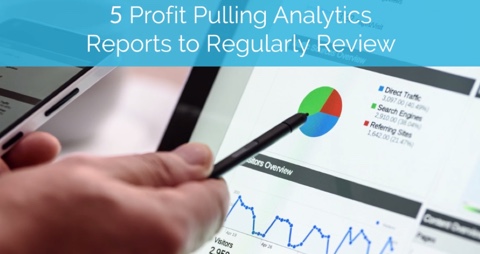You know how when you go to the grocery store and randomly see Lays chip display in the dairy section? Or chocolate at the end of the canned vegetable aisle? These displays are put in these odd spots for a reason: to see what customers will do, and whether they’re more likely to buy these specific products in this spot vs. their normal, chip and candy aisle spots.
It goes without saying that the stores know exactly how many units of each product are sold and the location from which customers grabbed them. Without accurate analytics on their products and customer tendencies, there would be no purpose in moving items around the store.
If only every company treated their website and its components like a grocery store – what bliss! Alas, this is not the case. Too many businesses try this and that on their website – changing button colours, images, text size – but never measure or analyze what happens after each change is implemented.
In our latest digital marketing video, we outline the reasons why pulling reports and analyzing data is not optional. If you want to improve your overall customer experience and increase sales, the number one way to do it is by regularly reviewing these 5 profit pulling analytics reports:
1. Referring Sites Report
At one point, links were the digital marketing goal. And while links are still important, it’s vital to remember that quality wins out over quantity every single time. 50 true, high quality links with iron-clad reasons to link to your pages are more helpful to your business than 500 empty, non-sensical links that were purchased or bartered.
The problem is most businesses have no idea what kinds of links point to their site (or they know they have some low-quality ones but have convinced themselves it’s okay). To ensure all is right with your website and the sites that direct people to it, a referring sites report is one of the most productive pieces of information you can get your hands on.
Once you have a solid understanding of the links and sites that are most helpful to your business, you can begin to build of the rest of your digital strategy on this data.
2. Content Engagement Report
In the same way not knowing which sites are referring traffic to you (and why?) is a potential hole in your marketing strategy, not understanding which content topics and types generate the most engagement with your audience is also a big blunder. Measuring – and then matching – visitor engagement to your overall objectives, and creating content that jives with these goals, is the ideal process.
3. Landing Pages Report
We’ve been over the importance of landing pages before, but it also deserves mention here because when it comes to website components you need to measure, landing pages are at the top of the heap.
The shift away from using home pages as landing pages is becoming more prevalent – and that’s a great thing. But there’s still a lag in how businesses are tracking and measuring the new landing pages they’ve implemented. More specifically, if you don’t know how well your lead capture efforts are functioning, then you won’t know your conversion rates – which is the entire purpose of landing pages!
4. Site Search Report
One of the most underrated and underused pieces of information about websites is the site search report. One look at what your website visitors are searching for will not only tell you what pages and content are most engaging, but it’ll also shed light on what confuses your visitors and highlight the information they’re looking for that you don’t have (ding ding ding: future content topics mega-alert!).
5. Mobile Performance Report
It’s no secret: more people probably view your website from a mobile device than a desktop computer. This is not to say desktop users shouldn’t still be a consideration – they should – but it does mean mobile performance should get half your effort and attention (and it likely doesn’t). Google’s Mobile-Friendly Test is one way you can determine how well your site performs for mobile viewers, but there’s also a host of reports you can easily pull and analyze. The mobile revolution isn’t just starting – it’s already happened!
If you would like more information on analytics or need help setting up tracking and reporting, get in touch with your local WSI Digital Marketing Consultant today.



